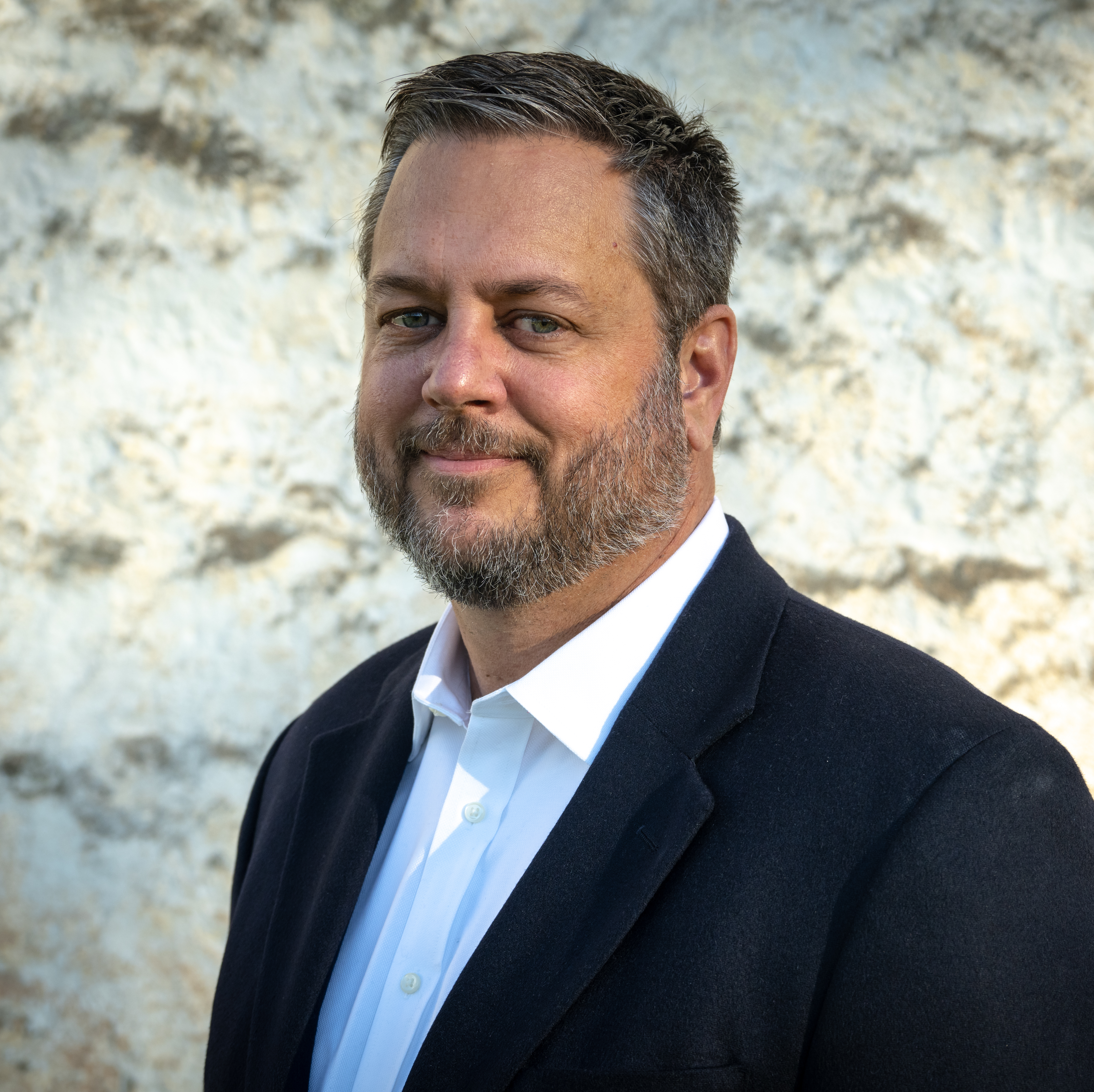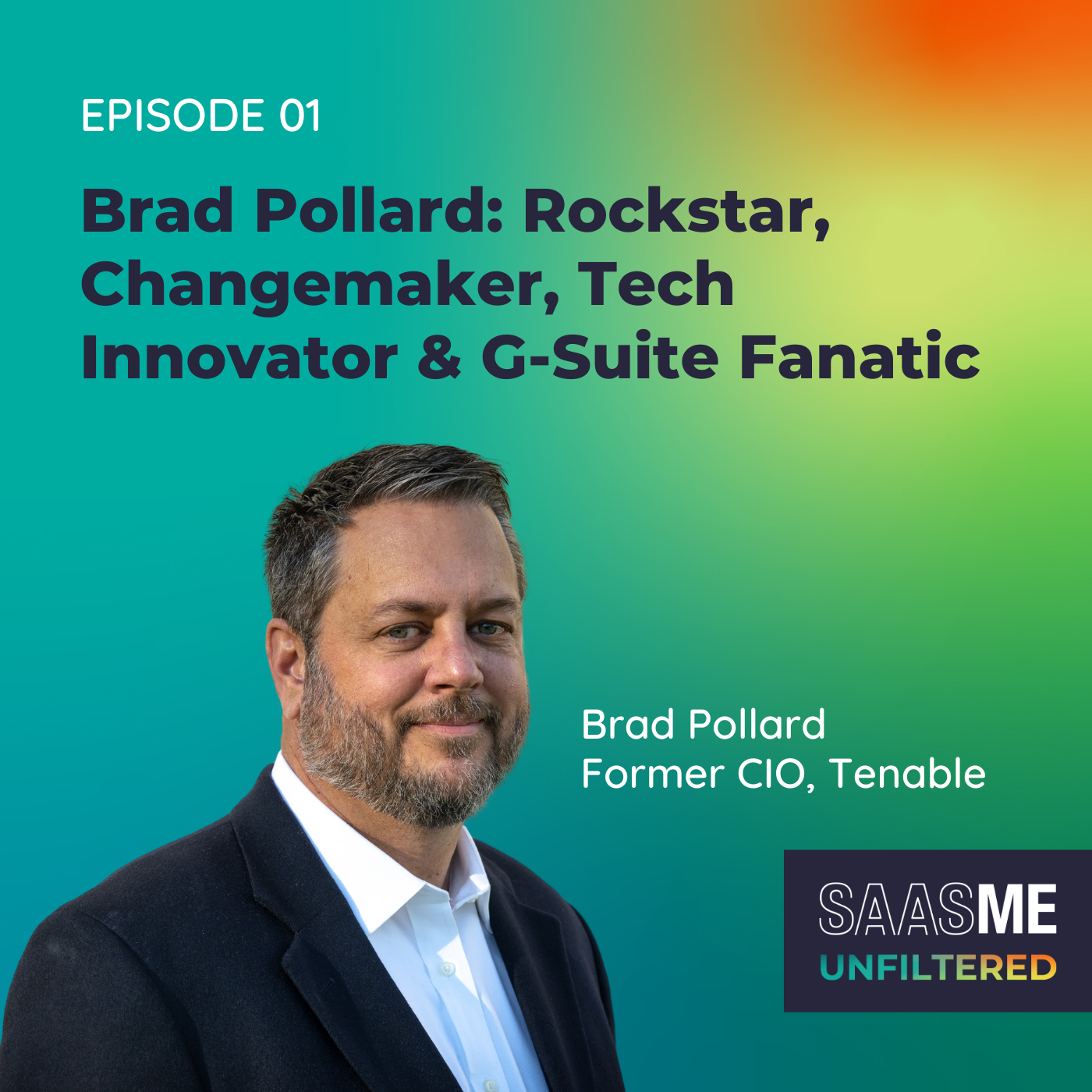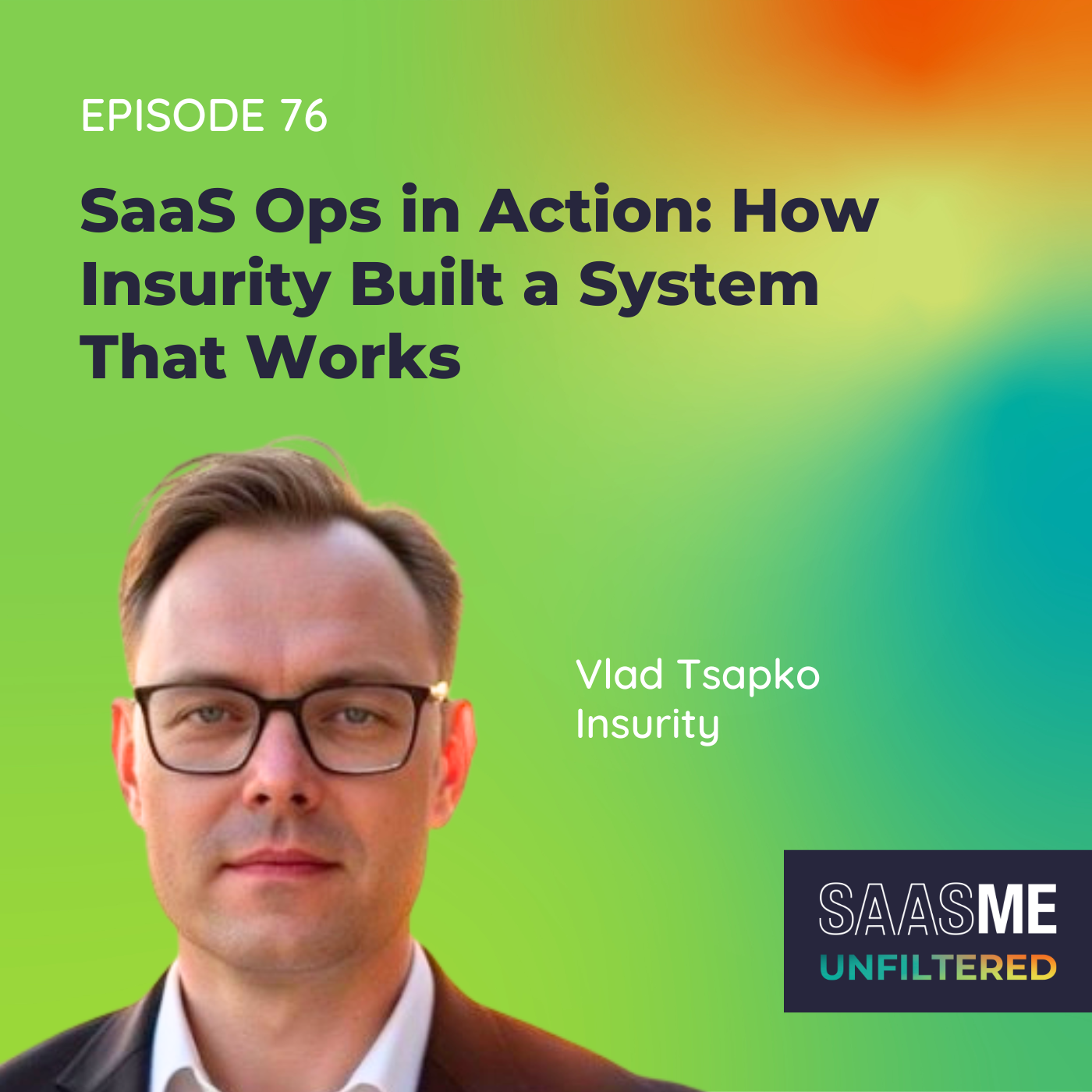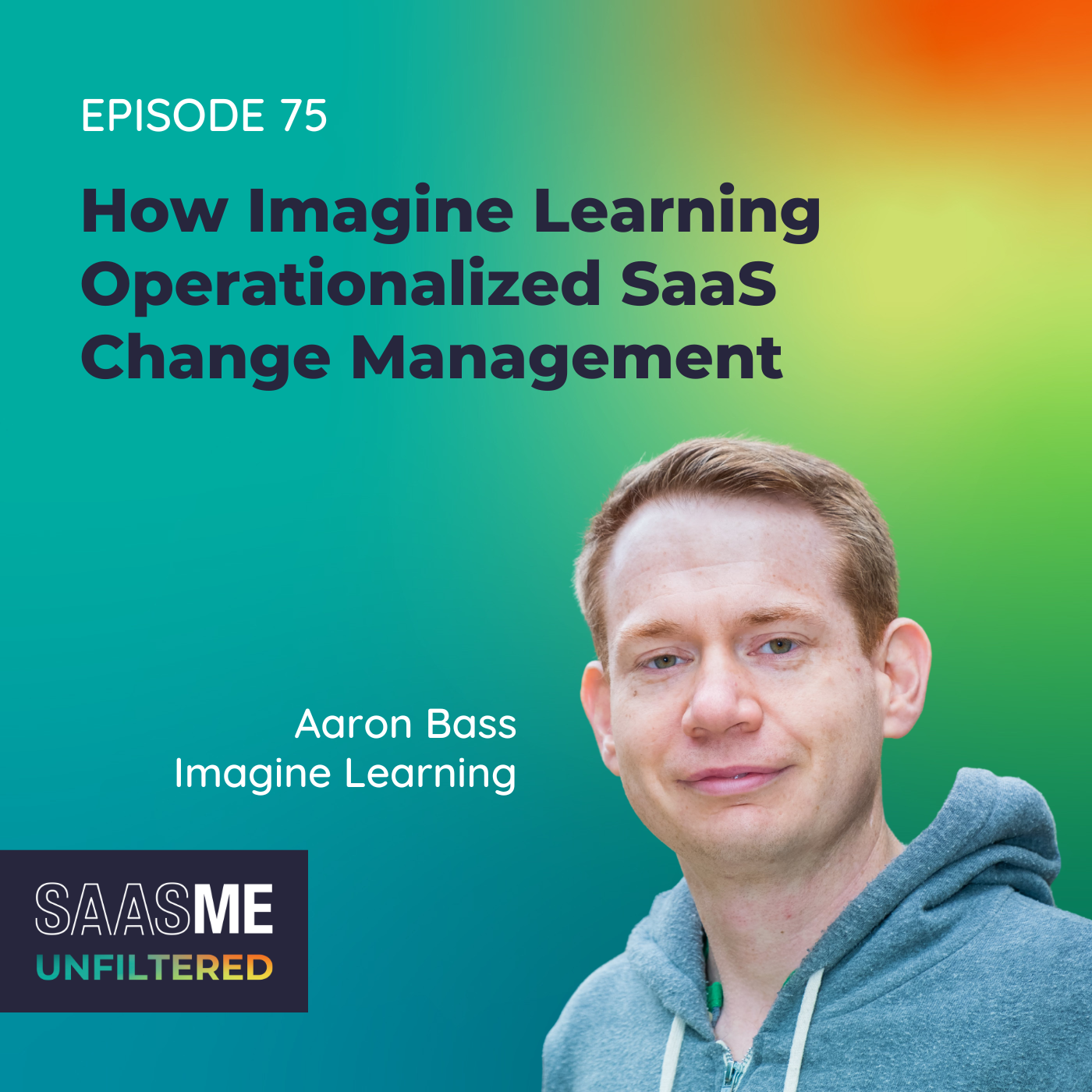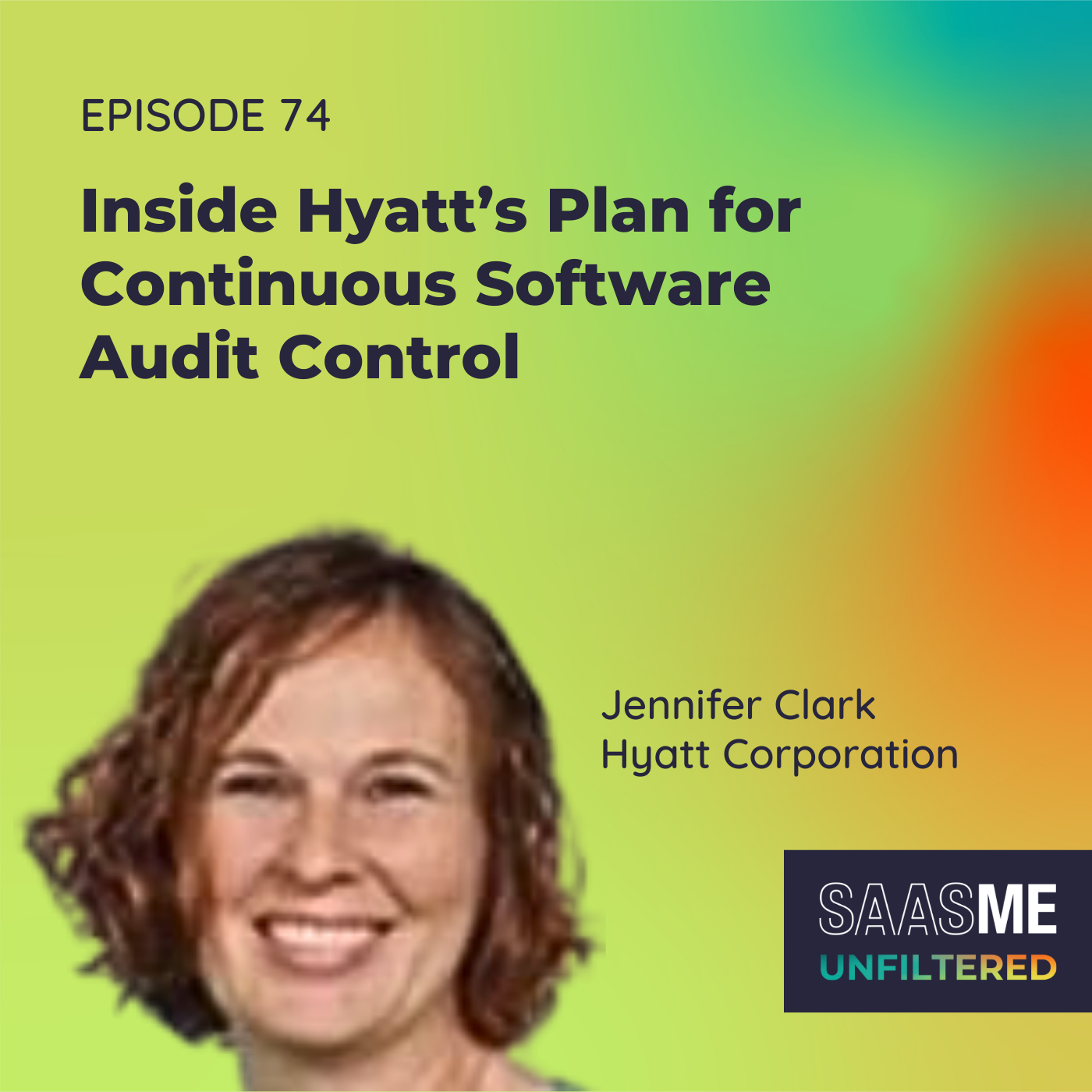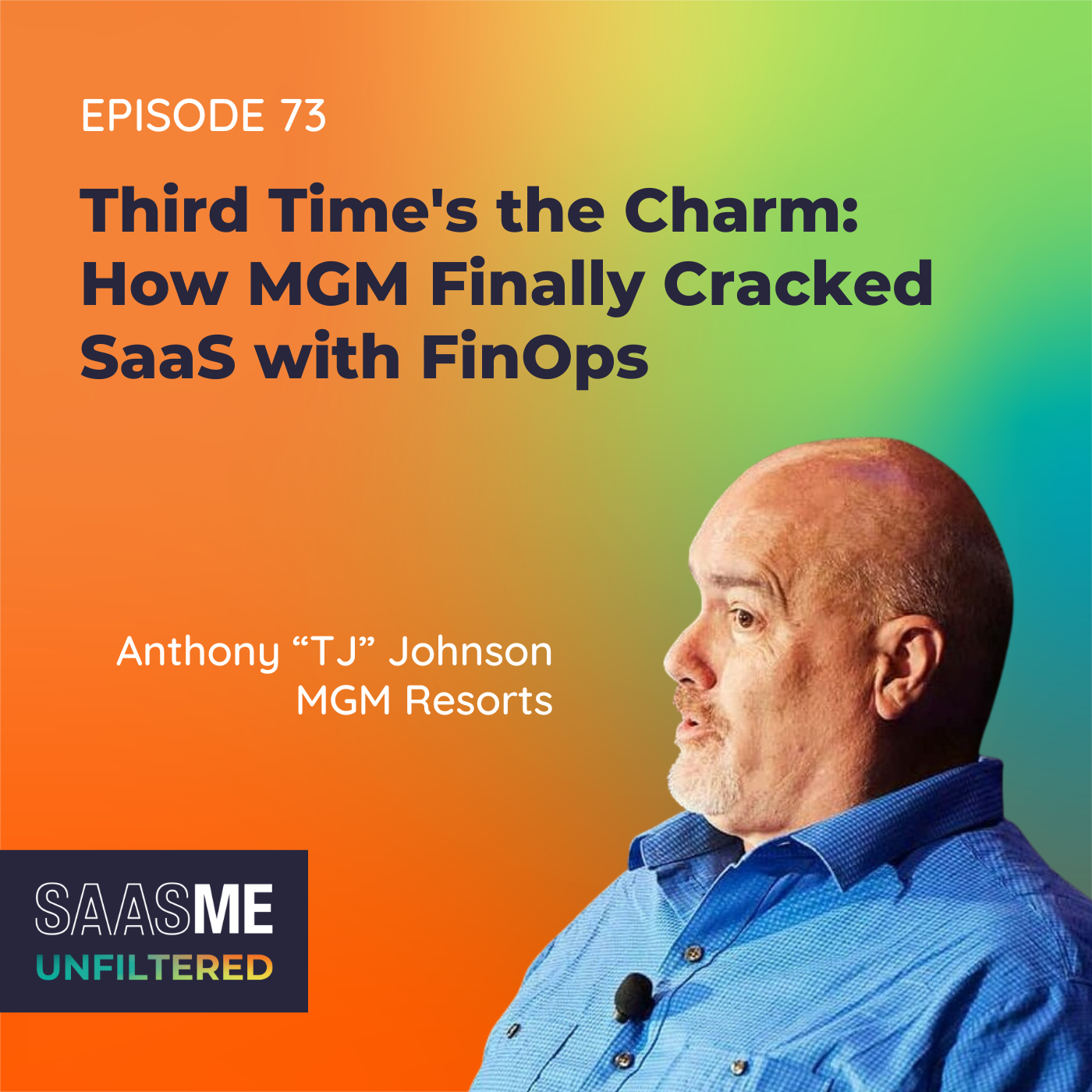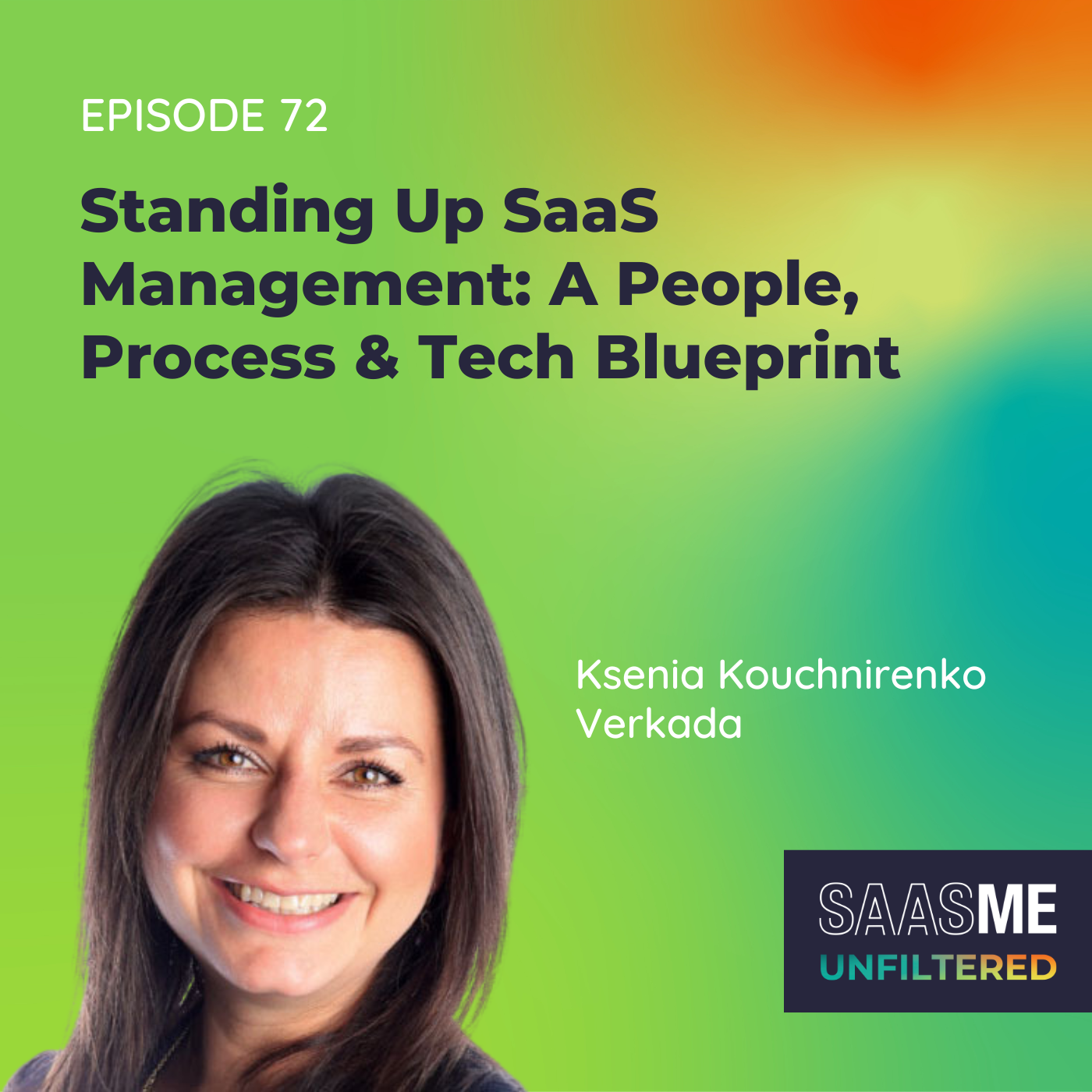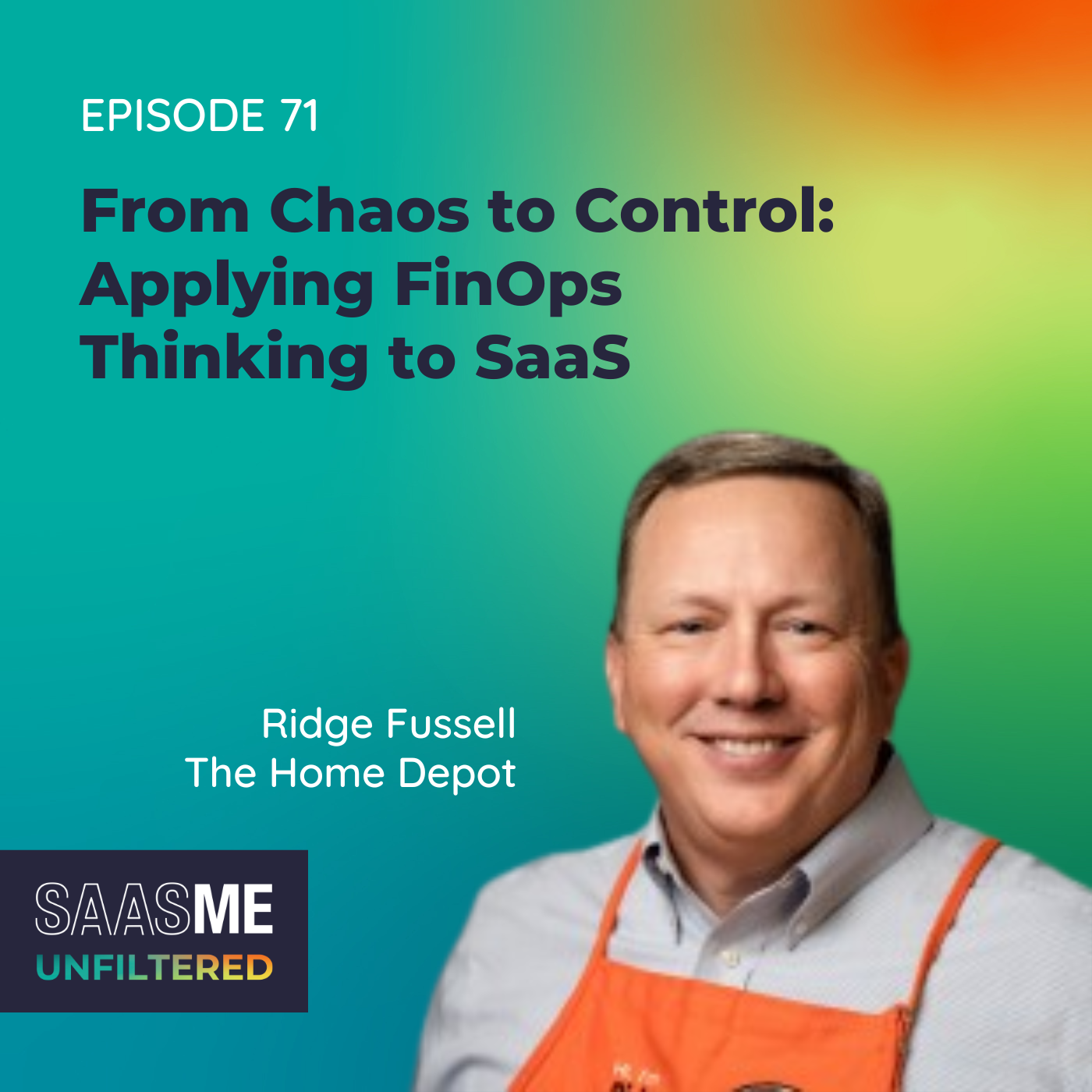Brad Pollard: Rockstar, Changemaker, Tech Innovator & G-Suite Fanatic
- 0.5
- 1
- 1.25
- 1.5
- 1.75
- 2
Brad Pollard: The realization of that vision of work from anywhere is, no matter where you are, you can do your job, and that was the philosophy. And it really hit hard with COVID and we were very successful. We actually had one of our best years and didn't miss a beat.
Cory Wheeler: Hello, hello, and welcome to SaaSMe Unfiltered, the SaaS management podcast, the show with give- it- to- you- straight, real life advice from pros, knee- deep in SaaS every single day, SaaS management superheroes, just like you. Hello, and welcome to SaasMe Unfiltered, the SaaS management podcast. My name is Cory Wheeler, the Chief Customer Officer here at Zylo.
Ashley Hickman: And I'm Ashley Hickman, the Manager of Customer Success at Zylo.
Cory Wheeler: So I'm pretty excited about the first episode launch today, really being able to share a lot of our SaaS management stories, bring our customers, our partners, a lot of folks in the industry that we're working with in to have conversations about SaaS management. The first guest that we've got lined up today, I'm exceptionally excited about. This person has been a friend of Zylo's for quite a while. So I first began working with this person back in March of 2018, if you remember, around the initial issue of SA management in most fast- scaling organizations. I would consider this person a pioneer in the space, jumping into a new concept with Zylo, when we were really building out that initial value prop, somebody that was addressing this at scale in their organization already, that we were able to partner with and truly start to drive a strategy inside their organization. So, without further ado, that person is Brad Pollard, former CIO at Tenable. Brad, welcome to the show.
Brad Pollard: Thanks for having me, Cory.
Cory Wheeler: So, you feel like the ideal guest to bring forward, to start talking SaaS management. Before we jump into some of those concepts, I want talk a little bit about you and your background, what landed you in the SaaS management world, but, really, prior to that, your role as a CIO. So maybe walk us through a little bit of what got you into IT, your path to a CIO and what that looked like throughout your career.
Brad Pollard: Yeah, sure. I didn't come by my technology career by having a plan. I was a musician when I got out of school, I have a degree in psychology and my goal was to try and become a rock star.
Cory Wheeler: Yes.
Brad Pollard: This was plan B.
Ashley Hickman: You look like a rock star in your studio today, Brad, sound-
Brad Pollard: I don't, I look like an old man in my studio today. But when I was a younger man, I really wanted to play music for a living. And I got into trying to promote the band through websites, and I started building websites and got involved with local ISP. I eventually got a job there. Am I allowed to say by lying that I knew things that I didn't know? I'll date myself. The interview was like, " Do you know Windows 95?" I'd never seen it. I'm like, " Yes, I absolutely know Windows 90..." And that's how I started.
Cory Wheeler: Fake it till you make it, Brad.
Brad Pollard: That's right. And that has been what the past 30 years has been, just kind of... Because, again, the landscape constantly changes. So I was working at ISP, helping people use Trumpet Winsock to connect to the internet from Windows 3.1, and walked... through connecting Windows 95 to dial- up, to doing ISDN line. Having T1s was the fastest bandwidth you could get, which is 1. 45 megabits a second. And that led to a career network engineering. And I worked at a big data company during the bubble. And then after the bubble, I left being a network engineer and a systems administrator for a company called Sourcefire, where I was just a generalist. It was a 20- person startup at the time. And I ran IT like we ran the ISP. We ran it very much as a service, right? It wasn't traditional. I didn't have a traditional IT background. I had this big service industry background, and that's the way we built CIS systems and everything else. So that turned into, dovetailed really organically into that approach when SaaS became, the value prop became really apparent to me, specifically, in middle part of the first decade of the 2000s when I wanted to move off of locally- run email to Gmail. We were one of the first enterprise G Suite customers at Sourcefire. And John Burris, who was the CEO at the time, said, " I want to do this." And he's like getting the support to move people off of Outlook into G Suite in 2006 was difficult, but he was supportive of the vision. And that was my first big SaaS move, right? And then I haven't looked back since then, because the value prop is so high. With growth companies, you can't grow your IT staff linearly with the rest of the company. You need to do more with less. And the expectation inside those companies is, I have the same things that my biggest competitors have, then you have a fraction of the budget. That's how I ended up in... And again, when I went to Tenable, it was really tasked to become a cloud- forward company, to move off of on- prem systems, to become very cloud leading. And we were flat in headcount for the past five years in my group, and the company grew almost five times.
Cory Wheeler: That's right.
Brad Pollard: It's from leveraging SaaS and leveraging it properly.
Cory Wheeler: Very interesting. I want to jump into that. But first, I want to ask what happened to the band?
Brad Pollard: It's been a addiction since I was 15 years old. I'm in at least two bands right now that I know of. I have some things going on that I haven't told other people that they're involved in yet. But I'm doing a lot of producing stuff now and engineering stuff. And the Venn diagram of people in the Baltimore area that played music together, back in the'90s when I was trying to do a lot, everyone's kids are grown and we're all doing it again. So I have people in here all the time and getting to work with really cool bands. Musicians are, they're the best people. They're just the most interesting, they're super creative, especially people that write original music. They solve the problem of there is no song, and then they go create a song. And that is always an awesome process to sit here with people and just their vision for those things. And I've met more musicians in the IT industry because of the correlation between math and music, so there's never a shortage people to play with.
Cory Wheeler: All right, I love that. Well, thanks, I love the background and I love the relationship that we've had over the last several years, thinking about how you started your SaaS management journey. And really, I think it reflects what you were just talking about, being able to hold your head count flat while your company was scaling 5X. Maybe talk a little bit about how you view new tech, emerging tech, different areas of innovation that are happening. You were very early, in early 2018, to see the SaaS management challenges that you were dealing with internally and partner with us to help build what we're driving today around SaaS management. And this is a very busy category, a very large category, that really affects every company in the world. But in 2018, that was something that you prioritized to work on with the business. How have you thought throughout your career about leveraging emerging tech to help you move forward and scale as a business?
Brad Pollard: That's a fantastic question, because that is the job. That's the CIO's job. And I think that when you built up your team where you really trust your lieutenants to run the operation, that's what we spend a lot of time doing. And right now, I stepped away from Tenable and I'm taking some time, really specifically, to reorient myself in what I think is a very dramatic time in how technology's changing. I spend three hours a day when I get up reading about blockchain. That ecosystem is exploding, the things that we were doing with machine learning and AI in the CRM tools. And again, someone like you, Corey, whose got a background in customer success, is the needle- in- a- haystack problem, where should I be focusing my energy and my attention, right? And so, AI and ML is now holding a magnet over that haystack and finding this is the customer that needs attention. So, I really see there's a really huge dramatic shift in how those things are happening. And I tease a lot of my friends that are financial guys, that are absolutely crypto haters or everything else that's there, and I said, " Listen, don't think about something like an NFT as a bored ape or something else that someone's paying way too much money for because it's a status symbol, think about what verifiable data means for the future of work, for the future of remote access, for the future of security." And it is, your mind just starts spinning. There's a lot of really cool things happening. And, like I said, I'm trying to reorient myself to see which way the wind's blowing right now. Because the things that I went to do at Sourcefire in 2002, when we had web servers in the janitor's closet, to the things we was doing at Tenable in terms of moving to a hundred percent cloud forward. You step in somewhere now and it's already cloud forward, and what's the strategic value of technology? Where are we going to add value? Where are we going to add competitive differentiation for the company? And how do we do it? Where do we get the money from? What do we spend it on? And you make those decisions. So it's definitely a great question, Corey. But it's been for the past, at least the past 10 years of my life, a daily focus to get up and look at what's going on and then research things.
Cory Wheeler: Yeah, I love that. I think... When I talk to leaders that have done something that large, from moving your infrastructure, your software, your apps, from on- prem to the cloud, as you executed that, for Tenable, in pretty short order, what were the hardest areas to migrate, to drive that digital transformation that we hear every company talk about today? But what were some of those largest moves? The hardest ones that you had to get over to be able to move all of that application infrastructure over to the cloud?
Brad Pollard: The first one is always the hardest one, and that was the G Suite migration. In my interviews that I'm not taking this job if you don't let me do it. I'm not running Exchange. We're not doing it. We're not doing'O3. I wanted to be on G Suite. But from a collaboration standpoint, I'm just a huge fan, absolute G Suite fanboy. Doing that is a cultural change. It's not just a technology change, but it's a cultural change. Not just from the end users, but from the email administrators. From the guys that were running Exchange, " You're taking away the thing I do." " Well, you're going to learn this new thing." God, in 30 years of doing this, I don't think I've ever did the same thing longer than four years ever, even though I was at companies for 12 years because the technology changed so fast. So the G Suite was the first one, and then we actually did a unified communications as a service going to voice over IP, a hundred percent. We went from on- prem SIP circuits to a full- blown Fuse implementation, and that was a global thing. Yeah.
Ashley Hickman: So, prior to coming on board at Zylo, I worked in IT consulting. And what you're talking about, the email migrations and getting email, just audio migrations, those are huge. Tremendous we're able to do that. So the biggest pain point and challenge that I saw in my past role and what we even see here at Zylo, it's really that change management and getting people to change their behavior. That's the biggest mountain people have to climb to make any digital transformation really successful. So, since you did, and so early on, that's incredibly impressive, because I was doing that before I came to Zylo. Still, back in 2015, 2016, 2017, helping people move to the cloud, doing it so early, I mean, that's huge. But how did you tackle the change management, getting people to change what they did day in, day out?
Brad Pollard: That is the hardest part. For me, I have a rotten personality and a horrible sense of humor, and so, I would use that to get people to be mad at me rather than the technology. But no, I mean you have to, again, lots of training, lots of politicking. You're talking to people when you're about to do it. The Gmail thing was probably three months of, this is happening, this is happening, this is happening. Slow rolling, while we were doing the prep work in the backend, but getting people on board and selling the collaboration factors and everything that went along with that. And the same thing held true for the unified communications as a service thing, which was we're really going to move from, we're going to have so much flexibility by doing this. And that all really played out in March of 2020. Our CEO called me on a Thursday night and said, " Everybody needs to work from home for the foreseeable future because of this pandemic. Is that going to be a problem?" But sort of an existential question-
Ashley Hickman: Yeah, inaudible.
Cory Wheeler: I know.
Brad Pollard: ... for you as CIO.We had done all the things that our customer service people could log into their queues from their home. The phone that would ring at your desk, now would ring at cell phone or your laptop. There were no resources you needed in any office, because it's all cloud forward. The realization of that vision of work from anywhere is, no matter where you are, you can do your job. And that was the philosophy, and it really hit hard with COVID, and we were very successful. We actually had one of our best years and didn't miss a beat.
Cory Wheeler: That's awesome. These are the stories that we hear a lot from our customers and really drive the larger narrative of what SaaS management is. But as the CIO in the seat, in March, 2020, the perspectives we heard were, " Get everybody fully up and operational. Just make sure business continuity is ongoing and our employees are highly effective and can do the same things at home that they can in the office." I assume that was your number one priority? We chatted a little bit about that. You just mentioned that. How did that shift throughout the pandemic? And then I would say, at the close of the pandemic, so late last year, early this year, what were some of the fallout or the benefit as a result of the pandemic, as it related to employee productivity, tooling, things like that? Where at the beginning it was everybody go, go as fast as you can and get everybody working. How did that shift over the course of the next year to two years when you look back on some of the decisions that you had to make very, very quickly?
Brad Pollard: I looked at COVID as a forcing function. We were ready, from a technology standpoint, five years ago, just in general and what's available. And maybe those of us that have been in this industry for a long time, took it for granted that this was not going to be a problem, but COVID was the forcing function. It just pushed everybody in that direction. And I think there were plenty of companies that saw big booms, Zoom being one of them, because of sudden mass adoption, and also saw some scaling issues and some security issues. But again, that is good for everybody. Everybody got a better Zoom out of that. I think the thing that changed the most wasn't the technology at all, but I think it was the attitudes of both employers and employees as to where I need to be to do my thing, and that people found new work/ life balance. Some people found that they were way better because they worked late at night versus having to drive to the office. And I was putting three or four more hours in a day, because I wasn't sitting through traffic. I know my story's not different than anyone else's. You look up and it's 8:00 at night and you're, " Oh crap. I did it again. I spent all day." My wife's in the other room, " I was wondering when you're going to come out." So, I think people started to figure out the balance a little bit. I think people's behaviors at home, they started to have areas specific for working, and when 5: 00 or 6:00 came around, they would move on. I don't think it was a technology change as much as it was a cultural change and one that's appears to be sticking.
Cory Wheeler: I would agree.
Brad Pollard: That speaks more to the fact that I think Gen Xers, like me, we get it. I am a very, and I always have been, a very results- oriented executive or leader. Which is, I've never cared where people are, just care about that they're getting their thing done. And I found that people were getting more done in this remote context. Some were, people with little kids were really struggling, because they had two kids home from school and everything else, but they found ways to do, work at different times, right?
Cory Wheeler: Yep.
Brad Pollard: You find ways around it. So, like I said, not a technology change, but absolutely a cultural shift that I don't think is ever going to go back to the way it was.
Cory Wheeler: Yeah. I think that's a great perspective. And I think that leads really well into the use case that I think about when I think of Brad Pollard. And I use this when I talk to a lot of our customers today. Earlier in the year, you and I had a conversation, and we haven't talked about this until right now, but it refers to what you mentioned earlier on, around being able to find a needle in the haystack. And you illustrated the need for a CIO to certainly be a leader and an executive and implement change, but really be trained to find that needle in a haystack. And you used a really great example with me. It was your telephony. I believe it was, maybe it was Fuze and Zoom, and how your telephone usage was shifting during the pandemic. And maybe you could share a little bit about that story, the things that you looked at, the instruments that you needed to have at your disposal to be able to understand what was going on in your business and how to make a quick change, as you were looking for that needle in the haystack through the pandemic. And I think you probably remember the example that I'm chatting about. Maybe walk through that a little bit with us, because it's an awesome story.
Brad Pollard: Yeah. So, when COVID hit, we had actually just built a whole new facility, five floors in downtown Merriweather, in Columbia, overlooking a concert venue, and then no one was there. And we came in to finish doing the work and I was walking around the building with my mask on, and I'm looking at all these phones on desks and I've really started thinking, " Nobody's using these phones anymore. Everybody's on Zoom all day, so not calling each other. Engineers live in Slack period. They'll never pick up the phone." So I went into your tool and I was looking at what is my adoption of my unified communications as a service? Again, this is now six years later, wildly successful when we put it in place, but it was a different time, and we were looking at 30 users. And again, I don't want to blast traditional telephony, but it's going away. People aren't doing it anymore. And so, I'm looking at what this bill is we're paying, again, through this tool. Okay, well where can I save money? CFO's always asking you where you can save money. And I always want to know what I can put it in to get more value out of the dollar. So I looked at it and it was my customer service team was still using it, inbound customer support calls. Other than that, I was not, everybody was Zooming period. And so, we looked at what it would be to move the voice over IP to Zoom phone, which is something that came out, and it ended up being a fraction of the cost. We ended up saving a ton of money that we were reallocating to other projects. So we ended up staying flat on budget, not losing any functionality and then having money to do innovation, do new projects. You can take money out of... And that's the thing about, again, the needle in the haystack is, utilization of something is always, or at least to date, mostly hearsay for SaaS platforms. And like, Cory, you and I were talking about, when new managers come in and they want an app they had at another store, and like, " Well, no one likes the app we have," and so, you have no data, it's all anecdotal. And then you go into a tool that measures it and you're like, Wow, this is really being used and sentiments really high. So I think we're good there. I don't think we need to spend more money," and go through the change management process of getting people to adopt a new tool. Having quantifiable real data saves so much time.
Cory Wheeler: Yeah. Previously having to aggregate that together, try to find the different teams internally, reaching out to your vendor to get some level of information, it's, in some cases, a fools errand.
Brad Pollard: And again, I've only ever worked in technology companies, where everybody there is smart and everybody there is technical and everybody there is trying to get things done, and in these growth companies, everyone's going really fast. Oh, someone's spinning up some SaaS tool, it ends up being shadow IT, but it's not malicious, it's someone trying to solve a problem. And so, it's like having something that, again, it's not going to be on your network. You're not going to see it unless you're looking at outbound connections. But if everyone's home, someone could spin up a SaaS thing that you never ever see the traffic to. You don't know what data's in it, you don't know what else is there. And the only way you find it is because of the integration with the CRM tool or the ERP system that says, " Hey, someone put this on their credit card," and you can go have a dialogue with someone and say, " Hey, let's get this onboarded properly." But without that integration, without that tool, you're absolutely blind to it.
Ashley Hickman: So, you just mentioned that shadow IT is not always malicious, right? Because that's definitely something that we see in terms of working with our customers here at Zylo. There's certainly a spectrum, people who it's welcomed. We want to make sure people have the tools to do their job, and then others that are very strict. So it sounds like you, maybe a little bit somewhere in the middle, so would love to hear your perspective and, really, approach to" what is shadow IT" and how you manage that or managed it.
Brad Pollard: Yeah. I don't think shadow It is malicious, first of all. Again, I think people are trying to get things done. And again, when you're working with really smart people, they don't need your help. They're going to go do this thing. And the thing that I find hysterical is everyone's like, " Well, no, I don't need any integration. It doesn't need to do this, doesn't need to do that." I'm like, there is no such thing as a standalone tool. I don't care what you're going to go turn on, there's single sign- on, there's multifactor authentication, there's governance, security, there's privacy, there's everything that has to go along with it. So, you got to partner with people. That is the challenge that all CIOs have, especially as the companies get bigger and bigger and more distributed, and again, more geographically diverse saying, " We're your partner. We're not going to say no." And I think the current CEO of Tenable said it the best, " The answer is always, yes. Let's figure how we're going to do it together." That's a much better sentiment than traditional IT groups where the answer's always no, because people just go do it. They'll just go do it. And you want people to just go do it. So you have to be ready to be somebody's partner.
Cory Wheeler: Makes a lot of sense. I think, something that you shared with us, which is really interesting and really aligned with Zylo's core values and vision and where we're heading is that, software has become completely democratized. 15 years ago, in whatever environment you were in, IT owned it, you provisioned it, de- provisioned, had a closet with your servers where you were maintaining all the updates to software. And now, everybody in the company is a buyer of software, whether you're an individual department or the IT organization, which is still owning those large applications. So, within that world, Zylo has always fundamentally believed that there are responsibilities and that it's not a one- department show any longer, and that finance, procurement, optimization- related roles go hand in hand with IT, strategy, enterprise architecture, and those groups come together to truly manage software inside most enterprises. You had a unique position where, for many years, you reported into the CFO. What are your thoughts on the ownership of software going forward in this distributed world? Is it that dual ownership? Is there a larger role that IT needs to play, or is it really allowing this very distributed category? One of the most important categories in any single company, categories of spend, categories of backend expenses, as that continues to be prioritized, where do IT and finance play those roles in the ownership and management of the strategy, overall?
Brad Pollard: It's a topic that's near and dear to my heart. I actually have worked for the CFO at the previous company and this company. And it's a very traditional model, but it is a model that views IT as overhead.
Cory Wheeler: Sure.
Brad Pollard: And I think what you're seeing, back to my whole reorienting where technology fits now, when I talk to CEOs about friends of mine who are hiring CIOs, " Where should this guy be in the organization?" And I was like, " Well, which part of your company doesn't use technology?" And the answer is usually, " Well, none. Every department uses technology." " Not just the finance department?" And that's where the question becomes, and where there ends up being breakdowns. And then you can talk to CIOs across the landscape here is, when a business unit wants a technology solution and then it's not funded, it's not an IT problem, it's a business decision. And that is something that should be discussed between the CFO, the CEO, the business unit and the CIO. Because the company as a whole has to make those decisions to fund those platforms or to fund those, and to prioritize those things. You can't, and this gets into the shadow IT situation. You can't do everything. You have to... And again, if you're a responsible CFO, you have a budget and you're keeping everybody to that budget. And if you're a responsible CEO, you're talking to your line of business units and you're having them prioritize where, is this going to generate more revenue? Is this going to increase customer satisfaction? Why are you prioritizing these things? And so, I think the communication has to be there. And adding a level of management, I think sometimes those messages get lost or watered down and causes undue confusion around something else like that. What I really think I'm seeing, Corey, and again, looking around the landscape now is people that used to have CIO titles are now calling themselves chief innovation officers or chief digital officers. Or, business units now have business unit CIOs that are specific to a vertical. And I think that is definitely the way to go. I mean, I think that, again, you have people that run the day to day, but someone that can know what's out there... It's been my job to know what's going on in technology, and that's all I do. I don't do marketing, I don't do sales. So when someone says, " I have this sales problem, how can we use technology?" " Well, you know what? I've been talking to this customer advisory board," or" I was talking to this venture capital company and they have this thing and let's try that." And so, you bring that shared expertise and you solve a problem creatively together, that's where it has to go. Traditional, again, I don't think you're going to have, even the CIO as I was doing it over the past seven years, I think is not the way it's going to be done in the future.
Cory Wheeler: Yeah.
Brad Pollard: I won't do it that way in the future. I mean, I will do it differently with what I've learned.
Cory Wheeler: Where does that accountability lie? So what I mean by that is, within IT, do you still own risk across the organization? Do you still own the employee experience with tooling? So, what bubbles up to IT is your core metrics, your core competencies, your core value as it relates to software and enabling your company?
Brad Pollard: So, that's a throughput problem, right? And what started changing over the past year was we started getting stakeholders that wanted to own the user experience for internal communications, for instance. So our internal comms folks wanted to take over all the accountability for Slack. We want to consolidate workspaces, we want to have curated channels, we want to do... We want to do all this work, as opposed to us was like, get it up and running, let the inmates run the asylum, and because they're going to do what they're going to do, and that was probably not the best end user experience. Right? We had great integrations, we had great stuff going on in that platform, but we were a small staff. For that app, there was no curator. And ended up happening is the two guys that run internal comm said, " Hey, we want to do..." and they actually had a big meeting and presented to me, and I was like, "You have me at hello." We were totally good with, we want to own this. I don't need to own it. I was thrilled to have those kind of stakeholders that wanted to not only take ownership in it, but really curate it. That's an important thing to the success of the implementation of these things, when we have really strong Salesforce administrators in the sales ops group. They're not developers, they're guys that do reports and do account data management and those sorts of things, but they're power users. And so, I think there's this, to your point, there isn't this vertical of this technical IT person, everybody's technical. My daughter jokes with my mother all the time, because my daughter's a marketing major. She's graduating in a couple weeks.
Cory Wheeler: Congrats.
Ashley Hickman: Congratulations.
Brad Pollard: And then she's going to grad school.
Cory Wheeler: Of course, all the kids are overachievers these days.
Ashley Hickman: They do.
Brad Pollard: She's so much smarter than me.
Ashley Hickman: Bam.
Brad Pollard: But she teases my mother all the time, because my mother's like, "What do you mean you work on computers? Are you a computer major?" She's like, " No, I'm a marketing major." " Well, what do you use the computers for then?" Everybody works on computers. There's nobody that's walking around with an Abacus or a notebook and a pencil anymore. And so, it's that blending of, and again, how technical people are, most people don't need a lot of IT help or support. And especially with SaaS enabling a big chunk of what they need to do, you need to partner for integration and some of the API work and security, but everybody's technical now.
Cory Wheeler: Yeah, makes sense.
Ashley Hickman: Yeah, absolutely. One thing that I'm curious about, because I have the pleasure of working with our customers here at Zylo, and people come to us for a lot of different reasons. So really curious for you, what was that tipping point at Tenable where, because you are SaaS forward, SaaS first, which I love, because that's really where we're seeing our customers going, that's what leads us to you, leads us to partnering with our customers. So for you, Brad, really, what was that tipping point where having a SaaS management platform, having a SaaS management provider really was necessary?
Brad Pollard: In my career, I'd written a bunch of applications, database applications, to track things. And as I got Peter principled into more and more management and executive management, I couldn't write my own apps anymore, just for sheer lack of time. And I didn't want to task my staff with it because they had bigger fish to fry at the time. So I was doing everything on spreadsheets. At least I'd built forms for G Sheets and everything else, and I was trying to store it that way. And I would, in my research, every day, get up and look for companies and this and that. And Zylo beat me to the punch, because I don't remember who the sales rep was, Cory, but it's one of the only cold emails I've ever replied to.
Cory Wheeler: That's huge.
Brad Pollard: And I-
Cory Wheeler: That's a trophy.
Brad Pollard: It is.
Cory Wheeler: We should have that on a trophy in the office.
Brad Pollard: I am about as surly as they come with cold emails and I don't just ignore them. Sometimes I reply to them, because that's sport for me. But this was one sentence, " Do you have trouble tracking all your blah blah? You should call me." It was one sentence. It was brilliant, and I was like, " Yeah, I do have that problem. That's me. I'm going to call that guy." And I think if I could find it, my reply was totally like, " Yeah, man, call me." And then he showed me what you guys were doing, and I could not... You try to have a poker face because you still got to negotiate pricing and everything. But I was trying as hard as I could not to laugh out of like, this is exactly what I wanted. And again, you guys over- delivered on what I ended up getting, because gave me so much more data than... I mean, I was just trying to get organized. I was just trying to be on top of what I have. I was looking for raw counts. How many apps do we have? It came up, and these are the questions that... CEOs and CFOs ask different questions. CEOs ask, " How many apps do we...? Why do we have 300...? What do we use 300 tools for?" The CFOs go, " Why is our spend this high? What can you do?" And when you can go and have, all right, well look, this is five redundant applications that we're doing here. Can we get this down to one? Can we get it down to two? Who are the stakeholders? Who's using it? Who's logging in? And you have all that data, you can go to work Monday morning in one of your manic modes and get your people together and go, "Hey, I have a project for you." But if you don't have that data, you can't even have those moments, you know? And it was really eye- opening and it was really far beyond what I even expected.
Cory Wheeler: I love that. That's a great use case. Okay, we-
Ashley Hickman: inaudible
Cory Wheeler: ...are coming up on the tail end of the show. So, we want to do something a little bit fun. We're going to throw out just a few word- association words and we'd love your quick response. What comes first to mind, how you associate to each of these words, okay? Shadow IT.
Brad Pollard: It just is.
Ashley Hickman: Right. SaaS management.
Brad Pollard: Not that hard.
Cory Wheeler: I love that response. Vacation.
Brad Pollard: Every day of my life.
Ashley Hickman: Music.
Brad Pollard: Passion.
Cory Wheeler: Beverage.
Brad Pollard: Scotch.
Cory Wheeler: Perfect. Very peaty scotch-
Brad Pollard: Very PD, correct.
Cory Wheeler: ...if remember correctly.
Brad Pollard: Right.
Cory Wheeler: He's a peaty scotch guy. I like that. Well, Brad, I can't tell you how thankful we are that you joined us on our very first episode. Hearing your stories, the strategies you've looked to implement after an awesome career thus far, are really, really incredible. Thanks again for joining us. I'm super excited to see where you're going for your next opportunity, after you've taken plenty of time to hang out on the beach, play some music, watch some sports and just chill out for a while. So, thanks so much for joining us.
Brad Pollard: Hey, thanks for having me. Really enjoyed it.
Cory Wheeler: Did you enjoy the episode? Pass it along to your friends. Subscribe to get notifications for the latest episode. Share your favorite takeaways and join the conversation on social media using# SaasMeUnfiltered.
DESCRIPTION
What do you get when you combine music and technology? You get Brad Pollard, former CIO at Tenable. From dreams of becoming a rockstar to leading early 2000s cloud migrations to navigating Covid-19, he’s been through it all. In this episode, Brad shares how SaaS is impacting organizations for the better and ways progressive CIOs can help their companies enable employees without hindering innovation.
Episode highlights:
- [6:31] Leveraging emerging tech to help move forward and scale business
- [9:15] G-Suite migration and communication improvements with collaborative software
- [10:50] Change management and steering human behavior to access new processes during the pandemic
- [13:23] COVID-19 as a forcing function to push mass adoption of remote and balanced work
- [16:13] Strong leadership with a knack for quick change and finding a needle in a haystack
- [20:15] Shadow IT, partnership, and figuring out problems together
- [22:43] Brad's thoughts on reporting to CFOs, and using technology to reduce costs, solve problems, and work efficiently
- [26:06] Accountability and having people to curate experiences with SaaS integrations
- [28:54] Discussing the tipping point where having a SaaS management provider and platform becomes necessary
Today's Host
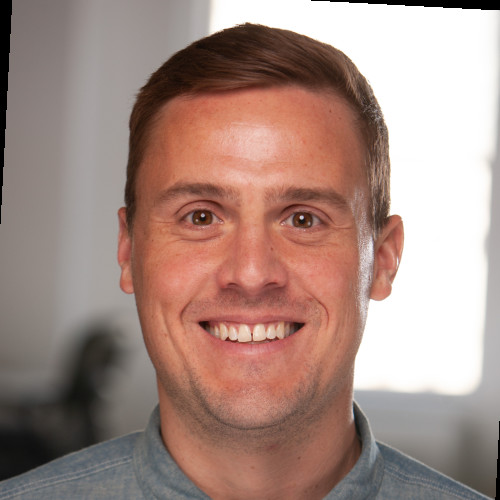
Ben Pippenger
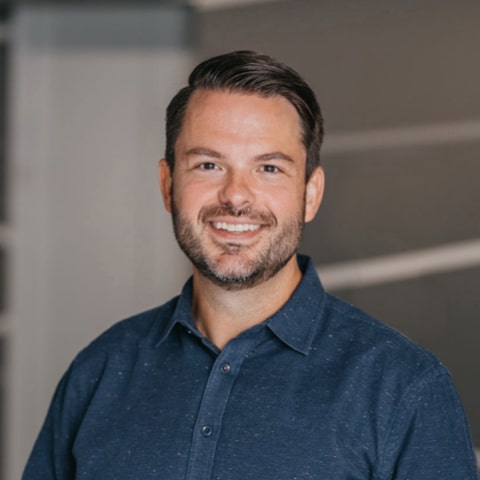
Cory Wheeler
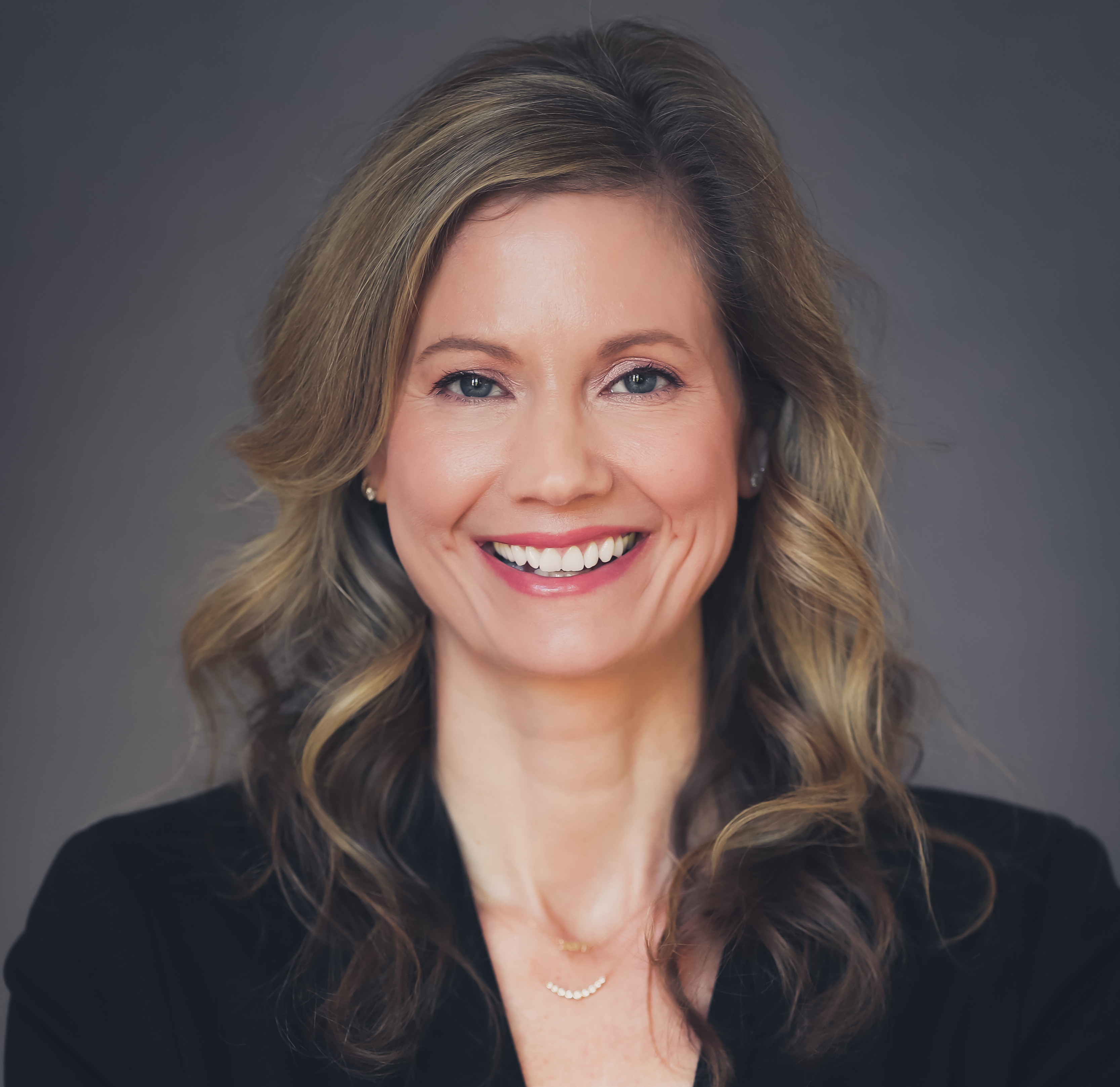
Meredith Albertson
Today's Guests
